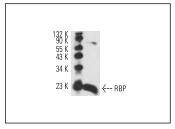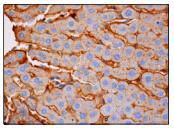Product Detail
Product NameRBP Antibody
Clone No.4G2
Host SpeciesMouse
ClonalityMonoclonal
PurificationProA affinity purified
ApplicationsWB, IP, IF, IHC(P)
Species ReactivityHu
Immunogen DescAmino acids 1-201 of RBP of human origin
ConjugateUnconjugated
Other NamesCellular retinol-binding protein antibody Cellular retinol-binding protein I antibody CRBP antibody CRBP-I antibody CRBP1 antibody CRBP2 antibody RBP1 antibody RBP2 antibody RBP4 antibody RBPC antibody RET1_HUMAN antibody Retinol binding protein 1 antibody Retinol binding protein 1 cellular antibody Retinol binding protein 2 cellular antibody Retinol binding protein 4 plasma antibody Retinol-binding protein 1 antibody
Accession NoSwiss-Prot#:P02753
Uniprot
P02753
Gene ID
5950;
Calculated MW25kDa
Formulation1*TBS (pH7.4), 1%BSA, 40%Glycerol. Preservative: 0.05% Sodium Azide.
StorageStore at -20˚C
Application Details
WB: 1:100-1:1,000
IHC: 1:50-500
IP: 1-2 μg per 100-500 μg of total protein(1 ml of cell lysate)
Western blot analysis of RBP expression in HepG2 whole cell lysate.
Immunoperoxidase staining of formalin fixed, paraffin-embedded human liver tissue showing membrane staining of hepatocytes.
Retinol (Vitamin A) is transported in the blood bound to its carrier protein, retinol-binding protein (RBP), also designated plasma retinol-binding protein (PRBP) or RBP4. A member of the lipocalin family, RBP conveys retinol from stores in the liver to peripheral tissues. In plasma, RBP binds transthyretin (TTR, formerly called prealbumin) to prevent glomerular filtration of low molecular weight RBP in the kidneys. The stability of this complex holds diagnostic importance because the molar ratio of RBP:TTR provides an indirect way to indicate marginal vitamin A deficiency. Vitamin A deficiency blocks the secretion of RBP resulting in defective delivery and supply to epidermal cells. Originally identified solely as a transporter protein, recent studies correlating increased levels of RBP expression in adipose tissue with insulin resistance have generated research into the possible roles the protein may play in the pathogenesis of type 2 diabetes and obesity.
If you have published an article using product 48333, please notify us so that we can cite your literature.




 Yes
Yes



